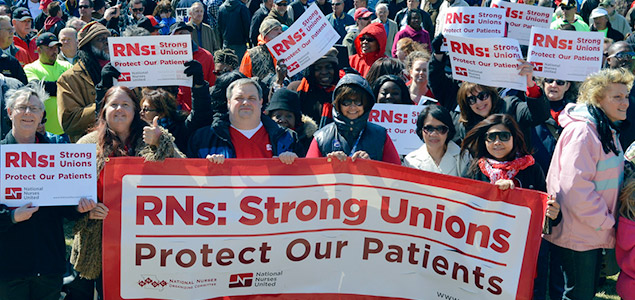Press Release
Court Attack on Workers’ Constitutional Rights the Latest Gift to Wealthy Corporations, says NNU

National Nurses United condemned the narrow Supreme Court decision today to bar workers from acting collectively to resolve illegal workplace discrimination as a “disgraceful assault on the rights of all working people” and a “direct attack on the Constitutional rights of freedom of association.”
In a 5-4 decision, the Court’s 5-4 pro-corporate majority bars private sector workers from joining together in class action lawsuits or other collective action in response to wage or other workplace discrimination by their employers, instead forcing workers to go through mandatory arbitration, a system that is regularly slanted toward employers.
“Once again this court has demonstrated that it cares more about the profit goals of big corporations than it does toward the rights of working people and their families,” said NNU Executive Director Bonnie Castillo, RN. “This decision will only accelerate the severe and growing wage and income disparity and employment discrimination that have become a glaring stain on our economic system and our democracy.”
Castillo lambasted the court’s “pretext” of alleging the Federal Arbitration Act supersedes the National Labor Relations Act (NLRA), as “nothing more than a thinly veiled wrapping for a gift to big corporations and other unscrupulous employers.”
“For nurses in non-union healthcare settings, this decision undermines their ability to not only protect their economic livelihood, it also poses a serious threat to their ability to act together to address unsafe conditions that threaten the health and safety of patients. That is unconscionable,” Castillo said.
NNU, said Castillo, “fully agrees with the sentiments of Justice Ruth Bader Ginsburg who wrote in her dissent that the court majority has dictated an “arm-twisting, take-it-or-leave-it contracts, including provisions requiring employees to litigate wage and hours claims only one by one.”
“The risks of employer retaliation,” Ginsburg noted, “would likely dissuade most workers from seeking redress alone” – a point, Castillo said, that was “exactly the intent of the Court, to destroy workers’ rights to act collectively even in the face of the most egregious bias or unsafe working conditions.”
Castillo highlighted the protections of the NLRA, “so cavalierly overridden by the court.”
The NLRA expressly notes: “The inequality of bargaining power between employees who do not possess full freedom of association or actual liberty of contract and employers who are organized in the corporate or other forms of ownership association substantially burdens and affects the flow of commerce, and tends to aggravate recurrent business depressions, by depressing wage rates and the purchasing power of wage earners in industry and by preventing the stabilization of competitive wage rates and working conditions within and between industries.”
NNU warns that this ruling is likely a preview of what workers can expect in an upcoming ruling in an even more high profile case, Janus v. AFSCME, that also threatens to roll back decades of union and worker rights.
“Tragically, we now have three branches of government, from the Congress to the White House to the Supreme Court that apparently have no respect for worker or workplace rights. It is up to all working people to act collectively to change these laws, and the people who are putting our communities, our families, and all of us at risk.”